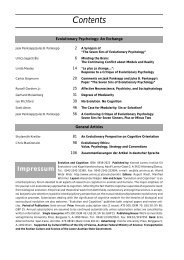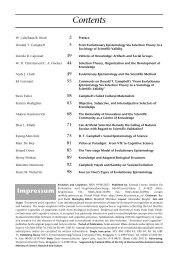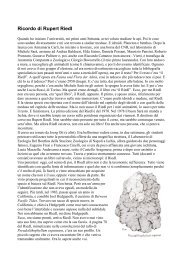Contents - Konrad Lorenz Institute
Contents - Konrad Lorenz Institute
Contents - Konrad Lorenz Institute
Create successful ePaper yourself
Turn your PDF publications into a flip-book with our unique Google optimized e-Paper software.
Ingo Brigandt<br />
account of the structure and function of the observed<br />
system and experiments can only then verify<br />
details about the components of the behavior of a<br />
species and analyze their causal interaction. In an<br />
analogous manner, Gestalt perception has to be employed<br />
first to detect interesting principles that are<br />
to be confirmed by induction. This suggests that the<br />
two step procedure Gestalt perception–induction<br />
can be mapped onto the observation–experiment<br />
procedure in a manner such that both correspond<br />
to each other. This interpretation means that observation<br />
in the ethological approach is largely driven<br />
by the cognitive process of Gestalt perception, while<br />
mainly the cognitive function of induction is used<br />
in the experimental phase. The fact that the experiments<br />
fulfill the analytic demands of inductive science<br />
became clear in my exposition of this method.<br />
As will be discussed in more detail in the next section,<br />
Gestalt perception actually corresponds in several<br />
respects to observation. Indeed, a main function<br />
of LORENZ’s account of the importance of<br />
Gestalt perception is to defend his observational approach.<br />
However, both in the Russian Manuscript and in<br />
Gestalt perception… there are passages that do not fit<br />
the simple interpretation given so far. The relation<br />
between Gestalt perception and induction is more<br />
complex. First, according to the references given<br />
above Gestalt perception and induction have an<br />
epistemically different status insofar as only the latter<br />
provides objective knowledge and in the case of<br />
conflict the result obtained by a rational process is<br />
to be preferred. Nonetheless, Gestalt perception and<br />
induction are not completely different with respect<br />
to their objectivity. In particular when defending<br />
the qualitative approach of ethology against views<br />
that consider only quantitative measurements as<br />
objective, LORENZ’s points out that all cognitive processes<br />
are in a sense subjective (1959, p320). In addition,<br />
perception tells us about the properties of objects<br />
in the external reality (1959, p301). In fact, it is<br />
the only source of knowledge about the reality surrounding<br />
us (1981, p41). Under standard condition—given<br />
that the ‘evidential basis’ is right—results<br />
obtained by Gestalt perception are true (1948,<br />
p62). Thus Gestalt perception is reliable, despite the<br />
fact that its results need to be rationally verified by<br />
induction.<br />
Second, in Gestalt perception… LORENZ explicitly<br />
states that the ratiomorphic mechanism of Gestalt<br />
perception and the rational process of induction<br />
cannot be sharply separated and that their functions<br />
(discovery/verification) intergrade.<br />
“It is quite definitely a simplification of this kind<br />
to represent the interaction between the various<br />
cognitive processes, as I have done above, as if there<br />
were always a distinct separation between the prior<br />
discovery of an inherent principle through ratiomorphic<br />
processes and its subsequent verification<br />
through rational processes.” (1959, p320)<br />
Quantification, which belongs to inductive analysis,<br />
is claimed to be dependent on Gestalt perception<br />
(1958, p256; 1959, p320). In fact, Gestalt perception<br />
is a precondition for rational reasoning at<br />
all (1948, p30). On the other hand, “rational, quantifying,<br />
statistical and surveying pre-treatment is<br />
necessary to permit Gestalt-formation” (1959,<br />
p320). There is a necessary cooperation of Gestalt<br />
perception and analysis/experiment (1981, p54).<br />
Rational and ratiomorphic processes are strongly<br />
entangled and the different steps of inductive science<br />
need Gestalt perception (1948, pp28ff). In the<br />
Russian Manuscript there are passages that sometimes<br />
suggest a strict separation and at other places<br />
an interdependency of both types of processes. Gestalt<br />
perception… proceeds by first suggesting a clear<br />
distinction between rational and ratiomorphic<br />
functions, which is then explicitly relativized (compare<br />
pp304–319 with 319–322).<br />
Thus LORENZ states that the relation between rational<br />
and ratiomorphic processes is complex and<br />
that both processes need to be highly entangled in<br />
the effective generation of knowledge. Nevertheless,<br />
he does not explain sufficiently how he views<br />
the interplay between these two processes in detail.<br />
(In Gestalt perception… he basically devotes two<br />
pages to this issues; see 1959, pp320f). The difficulty<br />
is that LORENZ tries to combine rational and ratiomorphic<br />
processes (which are of a different nature<br />
on his account) without a clear account of how they<br />
combine in practice. Despite these complexities, on<br />
my interpretation LORENZ still sees a parallel between<br />
the ethological methodology (observation<br />
and experiment) and the philosophical epistemology<br />
(Gestalt perception and induction). Not only<br />
are Gestalt perception and induction strongly entangled,<br />
observation and experiment also intergrade.<br />
Both are needed for ethology and in practice<br />
there is an interplay between them. Observation<br />
usually precedes experiment and suggests relevant<br />
experimental questions. Correspondingly, Gestalt<br />
perception leads the way of scientific investigation<br />
by proposing hypotheses that need to be confirmed<br />
by means of induction. LORENZ makes clear that Gestalt<br />
perception is crucial for observation, whereas<br />
experiments fulfill the role of scientific induction.<br />
Evolution and Cognition ❘ 164 ❘ 2003, Vol. 9, No. 2








